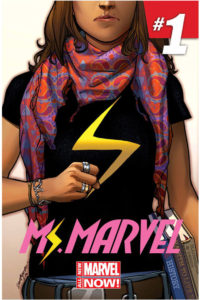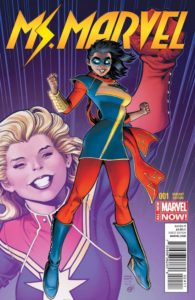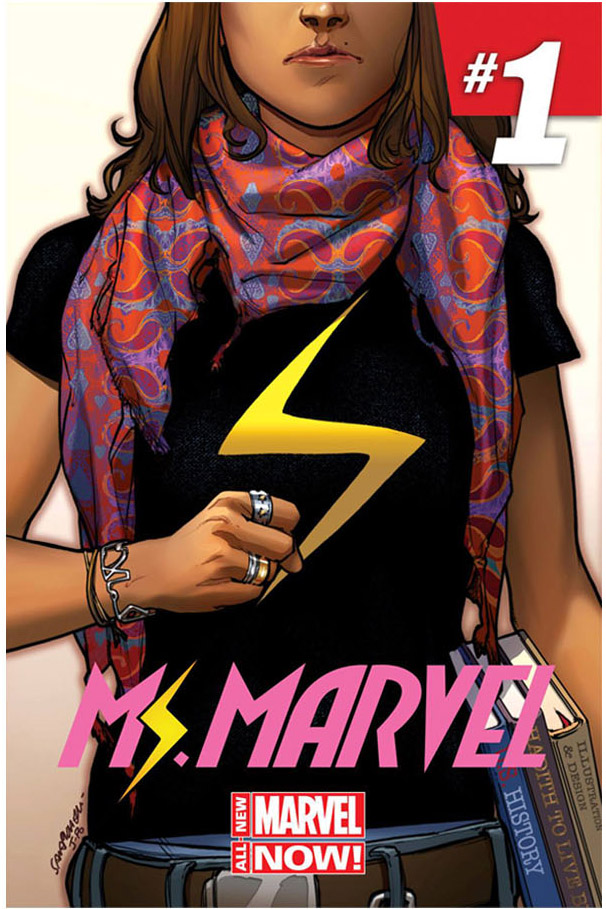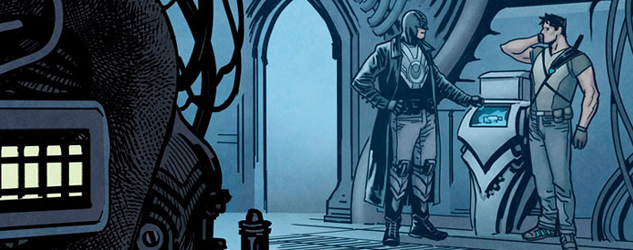Welcome back to Comics Are My Religion! I took another long hiatus to get my bearings and create a backlog of ideas for upcoming columns, but now I’m back!
And just in time, too, as something that I think is very important in the world of comics and religion has happened.
 Ms. Marvel #1 was published by Marvel Comics. Written by G. Willow Wilson with art by Adrian Alphona and Ian Herring, Ms. Marvel is the semi-controverisal new series of Kamala Khan, the newest character in the Marvel Universe. Kamala has been in the news because she is a teenage female Muslim superhero. Not only that, but she is written by a female Muslim writer.
Ms. Marvel #1 was published by Marvel Comics. Written by G. Willow Wilson with art by Adrian Alphona and Ian Herring, Ms. Marvel is the semi-controverisal new series of Kamala Khan, the newest character in the Marvel Universe. Kamala has been in the news because she is a teenage female Muslim superhero. Not only that, but she is written by a female Muslim writer.
Why is this a big deal? Muslims have been portrayed as heroes in Marvel comics for quite a while, especially amongst the X-Men, who are like the United Nations of superhero teams. Why has Kamala’s introduction been cast into the spotlight?
Let me answer this by prefacing that I am an American Christian, and I live in the South. If that demographic was portrayed in a comic book, it would likely be as a bumbling, racist redneck zealot. In fact, I have rather grown tired of seeing Southern American Christians portrayed in the media as bigots and close-minded idiots. Sure, we have many of those kinds of people here in the South. But whenever I see a Christian in comics, particularly clergy, they are usually cast as villains with a Bible in one hand and an energy arm cannon in the other. Such portrayals are often inaccurate and lack much imagination. Faith in the South, like anywhere, is much more nuanced.
Yet, however vilified Southern Christians are in media, this pales in comparison to the way Muslims have been treated. Even before September 11, 2001, Muslims were viewed with furrowed brows and scowls, but 9/11 cast Muslims in the level equivalent to the G.I. Joe-baddies Cobra in the real world. No one said that we were going to war with Muslims, but that is certainly what many people felt. I remember the personal fear I had of Muslims in those days, and I considered myself to be pretty progressive.
 Thirteen years later, and we are still struggling with what to do with Islam and the millions of people who adhere to its peaceful tenets. (Yes, I know the Holy Qu’ran has violent passages, but have you read the Bible?) Much like the ignorant yokels of Southern Christianity, militant Muslims have cast a pall on the faith, and has tainted many Americans with fear, anger, and bigoted reaction.
Thirteen years later, and we are still struggling with what to do with Islam and the millions of people who adhere to its peaceful tenets. (Yes, I know the Holy Qu’ran has violent passages, but have you read the Bible?) Much like the ignorant yokels of Southern Christianity, militant Muslims have cast a pall on the faith, and has tainted many Americans with fear, anger, and bigoted reaction.
Over the years, I’ve learned that when in doubt, just go talk to someone. I’ve cultivated friendships with many Muslims over the years who have taught me what Islam teaches. I’m certainly no expert, and I’m still more comfortable with my own faith in Christianity, but I have a great respect for Islam, and I believe my Muslim friends have a great respect for my faith.
So this brings us to Kamala Khan. I was holding my breath on any of this Ms. Marvel news until I actually read the first issue. I have read many of G. Willow Wilson’s essays and comic work. I have been a big fan of Adrian Alphona’s work on Marvel’s Runaways. I was hopeful that this book would be what I really wanted: an honest portrayal of a young Muslim in America. I got that and much more.
The issue immediately thrusts the reader into the “here-and-now” dilemma of young Muslims. They are the minority. People do not understand them. People try to patronize their faith and culture. They are struggling with their own identity in the face of misunderstanding and prejudice. They are honoring their faith and practice, yet imagining ways to bleed those into the American culture in which they have grown up. We get all of these things in just the first few pages of Ms. Marvel #1. Kamala has grown up in New Jersey, she goes to high school, she has friends, she has a practicing Muslim family who are all over the spectrum in terms of their devotion. The issue deals with the commonly American teenage problem of what to do when your parents restrict you from going to a party, only in Kamala’s instance, it is her religion that instigates the restriction. Kamala pushes against this as she explores her own values, and it gets her caught up in the beginnings of an adventure.
What makes this issue so important is that it sheds light into the American dilemma, not just the Muslim dilemma. That dilemma has to do with our identity. Americans are still fighting our silent civil war over our identity. Republicans claim it to be one thing, Democrats another. Same with Christians, Jews, Muslims, Non-religious, African-Americans, Native Americans, Anglo-Americans, and so on. Who are we?
Ms. Marvel, in 22 pages, shows us that we are all trying to figure this out. The search for the identity of America starts with the search for our own identities and how we relate to the identities of those who differ from us. We need this identity crisis to unfold in the pages of a comic book about a young Muslim female because we need to see such a character portrayed as faithful, as heroic, yet conflicted with her place in this confusing world. We don’t need more stereotypes of Muslims in order to learn about Islam any more than we need racist homophobes to depict Christianity. We need Kamala Khan to teach us how to be humans who value faith and heroism of all shades so that our world can draw together and make sure another 9/11 never happens again.
Ms. Marvel #1 is by far the best portrayal of a religious person of any faith in comics because it is a real portrayal. Wilson, Alphona, and Herring have invited us on a spiritual journey. This journey is not just Kamala’s, but our very own.
[divider]
For more Comics Are My Religion click here!
Jeff Jackson
The Comic Book Clergyman
jeff@comicattack.net



Great article, Jeff. As always, you tackle these subject matters with great insight and tact. It’s not enough to make me wanna check out the book (I’m just not that interested in reading about teenage female shapeshifters), but I’m glad that Marvel got off on the right foot with this one. I hope she becomes a successful character for them.
Thanks, SpidermanGeek. I know this book isn’t for everyone, but I think it’s important that Marvel continue to push the edges creatively, even if it bombs (although I don’t think this one does). We need some new characters for a new age, and mixing up the diversity in culture, religion, and gender is one of Marvel’s strengths. Even if this book doesn’t catch on, I believe it will be a stepping stone for even more thoughtful diversity in comics. But I hope Wilson and Alphona stick around on this for a long while.
Great article and it’s good to see that there’s an attempt to tackle tough subject matters such as politics and religion, etc. My question in general is where exactly does religion really fit in comics? I’m not trying to come across as condescending or be little the article or the new author of this comic title but honestly I don’t see any super hero’s carrying crosses, quoting Buddha or putting their faith in front of matters as a whole.
Daredevil got preachy at one point but that’s more of an exception than a rule. Now granted underlying morality does have a play which may or may not be driven by religion or philosophy. Regardless of religion, race, sexual preferences or tastes in food or attire, heroes are ultimately judged on their deeds not their personal attributes. I’m probably missing something but I just get this feeling that underneath all this Marvel is just looking to get the token gold star again.
Great question, Nathan. I’m of the opinion that a story of any kind doesn’t have to contain overt symbols of faith in order to say something about religion. For example, my favorite super-team, the X-Men may have dabbled with religious characters and symbols (Nightcrawler, William Stryker, etc.), but the core of the story (protecting a world that hates and fears outcasts) is a highly religious concept. To me, comics don’t have to be overtly religious in order to connected to religion.
I agree completely that Marvel is more interested in sales than in making any religious point. My observation here is that they actually got a religious character right, and therefore, they’ll get my cash.